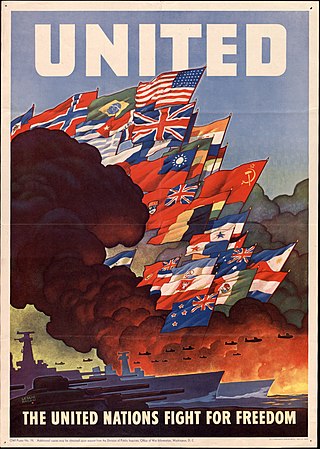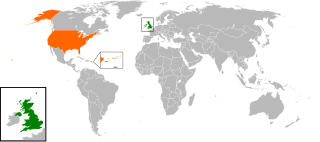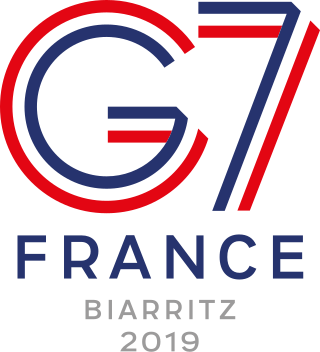
The Tehran Conference was a strategy meeting of Joseph Stalin, Franklin D. Roosevelt, and Winston Churchill from 28 November to 1 December 1943. It was held at the Soviet Union's embassy at Tehran in Iran. It was the first of the World War II conferences of the "Big Three" Allied leaders and closely followed the Cairo Conference, which had taken place on 22–26 November 1943, and preceded the 1945 Yalta and Potsdam conferences. Although the three leaders arrived with differing objectives, the main outcome of the Tehran Conference was the Western Allies' commitment to open a second front against Nazi Germany. The conference also addressed the 'Big Three' Allies' relations with Turkey and Iran, operations in Yugoslavia and against Japan, and the envisaged postwar settlement. A separate contract signed at the conference pledged the Big Three to recognize Iranian independence.

The Atlantic Charter was a statement issued on 14 August 1941 that set out American and British goals for the world after the end of World War II, months before the US officially entered the war. The joint statement, later dubbed the Atlantic Charter, outlined the aims of the United States and the United Kingdom for the postwar world as follows: no territorial aggrandizement, no territorial changes made against the wishes of the people (self-determination), restoration of self-government to those deprived of it, reduction of trade restrictions, global co-operation to secure better economic and social conditions for all, freedom from fear and want, freedom of the seas, abandonment of the use of force, and disarmament of aggressor nations. The charter's adherents signed the Declaration by United Nations on 1 January 1942, which was the basis for the modern United Nations.

The Special Relationship is a term that is often used to describe the political, social, diplomatic, cultural, economic, legal, environmental, religious, military and historic relations between the United Kingdom and the United States or its political leaders. The term first came into popular usage after it was used in a 1946 speech by former British Prime Minister Winston Churchill. Both nations have been close allies during many conflicts in the 20th and the 21st centuries, including World War I, World War II, the Korean War, the Cold War, the Gulf War and the war on terror.

The Group of Seven (G7) is an intergovernmental political and economic forum consisting of Canada, France, Germany, Italy, Japan, the United Kingdom and the United States; additionally, the European Union (EU) is a "non-enumerated member". It is organized around shared values of pluralism, liberal democracy, and representative government. G7 members are the major IMF advanced economies.

The Declaration by United Nations was the main treaty that formalized the Allies of World War II and was signed by 47 national governments between 1942 and 1945. On 1 January 1942, during the Arcadia Conference, the Allied "Big Four"—the United States, the United Kingdom, the Soviet Union, and China—signed a short document which later came to be known as the United Nations Declaration, and the next day the representatives of 22 other nations added their signatures.

Relations between the United Kingdom and the United States have ranged from military opponents to close allies since 1776. The Thirteen Colonies seceded from the Kingdom of Great Britain and declared independence in 1776, fighting a successful revolutionary war. While Britain was fighting Napoleon, the two nations fought the stalemated War of 1812. Relations were generally positive thereafter, save for a short crisis in 1861 during the American Civil War. By the 1880s, the US economy had surpassed Britain; in the 1920s, New York City surpassed London as the world's leading financial center. The two nations fought Germany together during the two World Wars; since 1940, the two countries have been close military allies, enjoying the Special Relationship built as wartime allies and NATO partners.
A summit meeting is an international meeting of heads of state or government, usually with considerable media exposure, tight security, and a prearranged agenda. Notable summit meetings include those of Franklin D. Roosevelt, Winston Churchill, and Joseph Stalin during World War II. However, the term summit was not commonly used for such meetings until the Geneva Summit (1955). During the Cold War, when American presidents joined with Soviet or Chinese counterparts for one-on-one meetings, the media labelled the event as a "summit". The post–Cold War era has produced an increase in the number of "summit" events. Nowadays, international summits are the most common expression for global governance.

The United Kingdom is a founding member of the United Nations and one of five permanent members of the UN Security Council.

Bilenky Cycle Works is an American handmade bicycle manufacturer located in Philadelphia, Pennsylvania.
The following is a timeline of the first premiership of Winston Churchill, who was the Prime Minister of the United Kingdom from 1940 to 1945 and again from 1951 to 1955. Churchill served as the Prime Minister of the United Kingdom during the bulk of World War II. His speeches and radio broadcasts helped inspire British resistance, especially during the difficult days of 1940–41 when the British Commonwealth and Empire stood almost alone in its active opposition to Nazi Germany. He led Britain as Prime Minister until victory over Nazi Germany had been secured.

The 45th G7 summit was held on 24–26 August 2019, in Biarritz, France. In March 2014, the G7 declared that a meaningful discussion was currently not possible with Russia in the context of the G8. Since then, meetings have continued within the G7 process. However, according to a senior Trump administration official, US President Donald Trump and French President Emmanuel Macron had agreed that Russia should be invited to the next G7 Summit to be held in 2020.

The 47th G7 summit was held from 11 to 13 June 2021 in Cornwall, England, during the United Kingdom's tenure of the presidency of the Group of Seven (G7), an inter-governmental political forum of seven advanced nations.
The foreign policy of the Joe Biden administration emphasizes the repair of the United States' alliances, which Biden argues were damaged during the Trump administration. The administration's goal is to restore the United States to a "position of trusted leadership" among global democracies in order to address challenges posed by Russia and China. Both Biden and his Secretary of Defense Lloyd Austin have repeatedly emphasized that no other world power should be able to surpass the United States, either militarily or economically. Biden's foreign policy has been described as having ideological underpinnings in mid-twentieth century liberal internationalism, American exceptionalism, and pragmatism.

The following is a timeline of the presidency of Joe Biden during the second quarter of 2021, from April 1 to June 30, 2021. To navigate between quarters, see timeline of the Joe Biden presidency.
The 2021 Brussels summit of the North Atlantic Treaty Organization (NATO) was the 31st formal meeting of the heads of state and heads of government of the North Atlantic Treaty Organization, held in Brussels, Belgium, on 14 June 2021.

The 48th G7 summit was held from 26 to 28 June 2022 in Schloss Elmau, Krün, Bavarian Alps, Germany. Germany previously hosted a G7 summit in 2015 at Schloss Elmau.

The 2022 Brussels summit was a meeting of the heads of state and heads of government of NATO held in Brussels, Belgium, on 24 March 2022. The meeting took place in the wake of the 2022 Russian invasion of Ukraine.

The following is a timeline of the presidency of Joe Biden during the second quarter of 2022, from April 1 to June 30, 2022. To navigate between quarters, see timeline of the Joe Biden presidency.















